


The second talk of Berkeley Lab's Science at the Theater fall series takes place tonight at the Berkeley Repertory Theatre with a talk by three Lab scientists—including Art Rosenfeld—entitled "Cool Cities, Cool Planet." Rosenfeld and fellow Environmental Energy Technology Division scientists Ronnen Levinson and Melvin Pomerantz will discuss how white roofs can cool your building, your city, and our planet. The event starts at 7 p.m. Go here for more information and a complete lineup of this fall's Science at the Theater events.
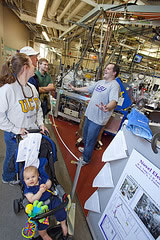 Employees who were unable to attend Open House, or those who want to relive the fun and excitement, can view a slideshow of the day here. Kids and adults alike soaked up the sun as well as the science concepts that were presented via hands-on activities, displays, lectures, and demonstrations. Among the most popular attractions were a Darfur stove that volunteers kept burning throughout the event, extracting DNA from strawberries, and the Ask a Scientist table, where visitors learned how the Internet works, what gives things color, and why dark energy exists, among other topics.
Employees who were unable to attend Open House, or those who want to relive the fun and excitement, can view a slideshow of the day here. Kids and adults alike soaked up the sun as well as the science concepts that were presented via hands-on activities, displays, lectures, and demonstrations. Among the most popular attractions were a Darfur stove that volunteers kept burning throughout the event, extracting DNA from strawberries, and the Ask a Scientist table, where visitors learned how the Internet works, what gives things color, and why dark energy exists, among other topics.
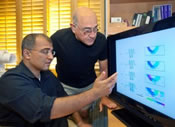 Alex Pines (right) and members of his research group, including Vik Bajaj (left), used a combination of remote instrumentation, JPEG-style image compression, and other key enhancements to apply Magnetic Resonance Imaging (MRI) to materials flowing through microfluidic “lab-on-a-chip” devices with unprecedented spatial and time resolutions. Pines and Bajaj were able to record images a million times faster than with conventional MRI, which paves the way for experiments that would have taken years to complete. More>
Alex Pines (right) and members of his research group, including Vik Bajaj (left), used a combination of remote instrumentation, JPEG-style image compression, and other key enhancements to apply Magnetic Resonance Imaging (MRI) to materials flowing through microfluidic “lab-on-a-chip” devices with unprecedented spatial and time resolutions. Pines and Bajaj were able to record images a million times faster than with conventional MRI, which paves the way for experiments that would have taken years to complete. More>
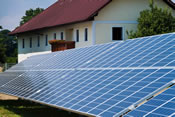 A new report by Ryan Wiser and Galen Barbose of the Environmental Energy Technology Division has found that state-level renewables portfolio standard (RPS) programs have proven to be an important driver for solar energy deployment in the U.S., resulting in more than 250 megawatts (MW) of new solar capacity through the end of 2009. Currently, 29 states and the District of Columbia have enacted mandatory RPS policies that require retail electricity sellers to supply a minimum percentage or amount of their retail load with eligible forms of renewable energy. More>
A new report by Ryan Wiser and Galen Barbose of the Environmental Energy Technology Division has found that state-level renewables portfolio standard (RPS) programs have proven to be an important driver for solar energy deployment in the U.S., resulting in more than 250 megawatts (MW) of new solar capacity through the end of 2009. Currently, 29 states and the District of Columbia have enacted mandatory RPS policies that require retail electricity sellers to supply a minimum percentage or amount of their retail load with eligible forms of renewable energy. More>
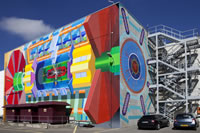 Last Wednesday, the ATLAS collaboration at CERN’s Large Hadron Collider (LHC) unveiled a mural by American artist Josef Kristofoletti, one-third the size of the giant experiment buried 100 meters below it. Kristofoletti, inspired by study in Italy, says: “When I think about the LHC, it always seems like an unprecedented cathedral of science. I think this will be a modern-day version of a Renaissance fresco.” Says Michael Barnett of the Physics Division, ATLAS Outreach Coordinator: “We were thrilled to learn that ATLAS and particle physics had found their way into popular art. And it was a natural next step to bring that art to CERN.” More>
Last Wednesday, the ATLAS collaboration at CERN’s Large Hadron Collider (LHC) unveiled a mural by American artist Josef Kristofoletti, one-third the size of the giant experiment buried 100 meters below it. Kristofoletti, inspired by study in Italy, says: “When I think about the LHC, it always seems like an unprecedented cathedral of science. I think this will be a modern-day version of a Renaissance fresco.” Says Michael Barnett of the Physics Division, ATLAS Outreach Coordinator: “We were thrilled to learn that ATLAS and particle physics had found their way into popular art. And it was a natural next step to bring that art to CERN.” More>
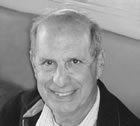 Harold (Skip) Wollenberg, a geologist instrumental in the formation of the Earth Sciences Division, passed away on August 11 at Sutter Medical Center in Santa Rosa after a month of serious illness; he was 77. His work included geothermal exploration and characterization of non-volcanic sites. The approaches that Wollenberg and his colleagues developed have since been adapted by industry to successfully produce geothermal electricity from non-volcanic sites. He was an internationally known expert in the application of nuclear geology to geothermal and environment-related problems. He traveled widely as a geologist, including to post-Soviet Russia. Some of his experiences are included in the book, "Along the Way," which he co-authored. More>
Harold (Skip) Wollenberg, a geologist instrumental in the formation of the Earth Sciences Division, passed away on August 11 at Sutter Medical Center in Santa Rosa after a month of serious illness; he was 77. His work included geothermal exploration and characterization of non-volcanic sites. The approaches that Wollenberg and his colleagues developed have since been adapted by industry to successfully produce geothermal electricity from non-volcanic sites. He was an internationally known expert in the application of nuclear geology to geothermal and environment-related problems. He traveled widely as a geologist, including to post-Soviet Russia. Some of his experiences are included in the book, "Along the Way," which he co-authored. More>
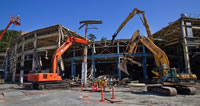 Demolition of the Building 51 structure began last week. Measures to protect Lab personnel and vehicles will require the closure of the upper parking lot adjacent to the building (Lot I), resulting in the temporary loss of 22 parking spaces. The Lot will be closed starting today, with a planned duration of about three months. The lot will be reopened at the earliest possible date, consistent with necessary safety requirements. Contact John Patterson (812-6174) or Bob Cronin (x7854) for more information.
Demolition of the Building 51 structure began last week. Measures to protect Lab personnel and vehicles will require the closure of the upper parking lot adjacent to the building (Lot I), resulting in the temporary loss of 22 parking spaces. The Lot will be closed starting today, with a planned duration of about three months. The lot will be reopened at the earliest possible date, consistent with necessary safety requirements. Contact John Patterson (812-6174) or Bob Cronin (x7854) for more information.
Today
at Berkeley Lab encourages feedback and story ideas
Deadline for submissions is 10 a.m. two days prior to publication
TABL is produced by Public Affairs' Communications Group